After his ingress into Gniezno. the new Archbishop began his program of renewing the national spirit in preparation for the thousand-year anniversary of Polish Christianity. The focus of his plan would be complete entrustment to Mary in the struggle for to preserve an endangered national faith.
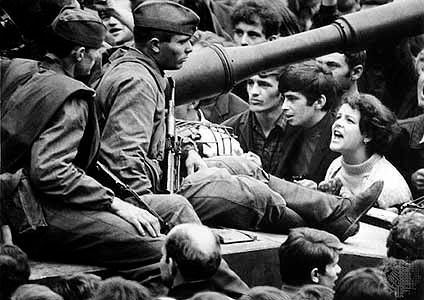
Soviet soldiers being heckled by a crowd.
Radiating a tender love of Our Lady, the Primate set about lighting a beacon of faith in postwar Poland. Knowing that the Polish people as a whole had to oppose the the subjugation and Marxist indoctrination of their country, Archbishop Wyszynski decided to light a torch of faith, hope and love for the nation.
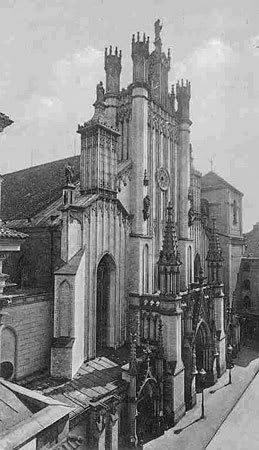
St. Johns, Warsaw.
He began his mission by rebuilding fifty churches in Warsaw, including the Cathedral, all of which lay in ruins. Needing to make up for the loss of over three thousand priests in the war, he paid close attention to the seminaries, personally leading retreats as well as being present for all important feasts and holidays.
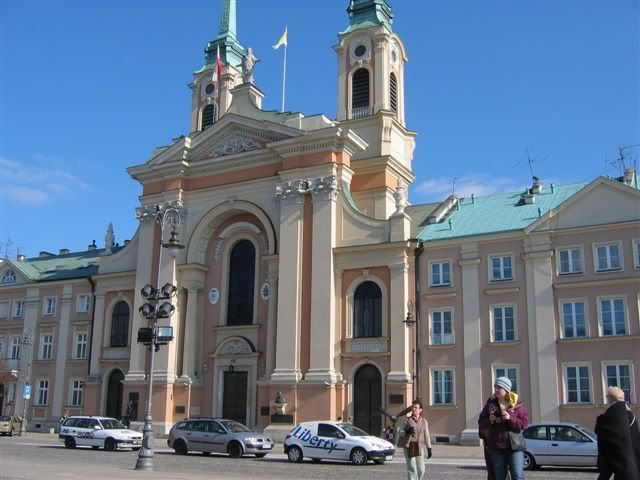
Church of Our Lady Queen of the Polish Crown, Warsaw.
Wanting to preserve the close bonds between the church and its people, Wyszynski had a strong desire to exercise his fatherly leadership to a nation deprived of independent leadership. Being in two and three places at time, confirming, inspecting and dropping in on parish churches and monasteries, he found himself in the midst of the people, whose parishes were soon creating more opportunities to be with their Primate.
To strenghten the ties of the Polish Episcopate, the new primate sought frequent meetings of the nation's bishops. They would come to meet every two months, as the Archbishop felt that the unity and strength of the Church would be the best way to counter the coming threats of communism.
Interestingly enough, a gift from the first parish he visited prophetically symbolized the primate's future destiny, as the parishioners gave him a painting representing Christ the King. In this painting, Our Lord's hands are bound, with a soldier holding Him by the shoulders. The Primate hung it in his office in Gniezno, where it was to become a symbol of his fate.
Ominous clouds quickly gathered on the horizon, for at the same time Archbishop Wyszynski was taking over the leadership of the Polish Church, the leader of the Communist Party was demanding the separation of Church and state, as well as the laicization of education. This was clearly a portent of future events.
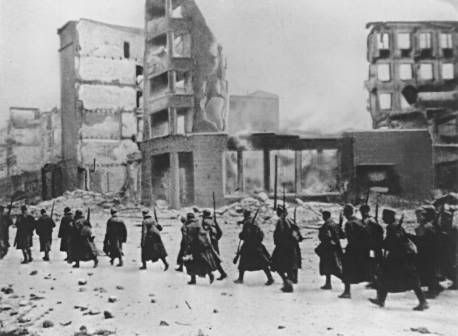
Soviets.
As Adam Micewski puts it, "Within the country, Stalinist totalitarianism was being articulated in concrete and highly dangerous steps: the forced collectivisation of agriculture...the elimination of private property...the spreading terror of the security forces. Scholarship, culture, and the media were submitted to purely political control and the most rigid version of Marxist orthodoxy. Everything was brought into line with the economic and political dictates of the Eastern bloc..." (Micewski, p.58-59)
Additionally, in an attempt to split the Church, an organization of "patriotic priests" friendly to the government was created by the communists to try and compromise the authority of the
bishops.
On January 1, 1952, the Vatican was attacked in the Polish communist press as having "a negative attitude toward the needs of contemporary Poland" and of giving in to the NATO alliance.
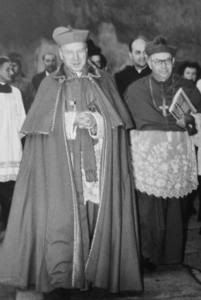
On a visit to a parish.
The Archbishop's response to this New Year's Day attack were a testimony of his courage and fortitude. "Whatever God demands - I shall fulfill. It is all the same to me whether I have to sow words and examples, or my own blood, as long as Poland remains Christ's kingdom" (Micewski p.73)
While working to divide the church, and attempting to cut off the attachment of the people to her through the new program of "laicization of education", the government also tried to strike at the heart of Polish morality by the corruption of the legal system. This first attack came with a proposed change in the penal code making the penalty for abortion less than that that of destroying trees.
Next came a nefarious campaign of intensified pressure on the church through increased taxation, liquidation of Catholic kindergartens and the seizing of monastic houses.
Of particular relevance to Catholics in our time is the fact that as the crisis in his country worsened, the Archbishop's attachment to the Holy Father only deepened. As Micewski quotes the Primate, "I need Rome like the air, like drops of water on thirsty lips. All day I suffer from this insuperable longing. I pray for the Holy Father all day..." (Micewski, p.82)
The assault on the Church continued. On July 1, 1952, while the Archbishop was on retreat at Jasna Gora with priests from Warsaw, he first heard the news that the government was liquidating the minor seminaries.
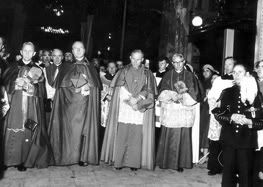
The Primate with priests.
Attacking the Church from all sides, the government attempted to destroy the Catholic press through censorship and sabotaged distribution. As Micewski tells us, "...the Sunday Guest in Katowice had been suspended by the authorities, and Sunday in Czestochowa had been trimmed from 100,000 to 10,300 copies. In Gorzow, the censors were clipping more than 60 percent of each week's text in the Catholic Weekly. By these methods the authorities hoped to drive the publications into bankruptcy, but the Primate reminded the editor's that out of apostolic considerations they should keep operating, even at a loss." (Micewski, p.96)
In the midst of this systematic campaign to destroy the Church and install a new religion of atheistic ideology on the Nation, Providence was to strenghten the hand of the Primate with a telegram from Rome announcing the elevation of Stefan Wyszynski to the College of Cardinals in the coming January, 12, 1953 consistory.
However with this joyful telegram came news that the government was going to try to attempt to take over the episcopate beginning with the forced election of a "vicar capitular" to run the Diocese of Katowice. However on November 30, 1952, the Primate informed the priest in question that his forced election was invalid. The authorities however, were now demanding the election of a "vicar capitular" in Krakow, where the staff of the curia had been arrested - as the government wanted to make Katowice a model for which to take over the Church.
On December 12, the Primate spoke:
"We may have the right to sacrifice ourselves, but we may not sacrifice the dioceses, the Church, and the faithful. Where the bishops and priests disappear, so does the Church. It is up to us to defend a clergy that has been exhausted by the war and the concentration camps and today shows itself more ready to come to an agreement (with the government) than ever...At the moment the Polish nation is leaning on the maternal shoulder of the Church. We must act, therefore, in such a way that the nation does not lose its grip on this shoulder" (Micewski, p.99)
For Archbishop Wyszynski, the government's attempt to take over the dioceses through the expulsion of its leadership on trumped- up charges was the final straw, as the government had already thrown religion out of the schools, liquidated the Catholic press and created pseudo- catholic groups. Poland's rulers had created a vision of the Church subject to them. While the pseudo-catholics would not speak the truth, the Primate would, even though he knew the price he would have to pay would be a high one:
"Similarly, if we are given the choice between personal sacrifice or turning over the church administration into a tool of the secular authorities - we shall not waver. We shall follow the apostolic voice of our calling and priestly conscience, with inner peace in the consciousness that we have not given the least reason for our persecution, that suffering shall become a part of our share in the affairs of Christ and Christ's church. We cannot place what belongs to God on the altar of Caesar. Non possumus! (We cannot!) ( emhasis added, Micewski p.116)
For the Primate, the Church would stand together with the Catholic nation during this period of sufferings and assaults. Finally, the prohetic words came, "I will choose imprisonment over privilege, because in prison I will be at the side of the most tormented ones. Privilege could be a sign of leaving the Church's proper road of truth and love" (Micewski, p.129)
The price the Primate was to pay for his fidelity to the Church and the Polish nation would be a remarkable sign to both the nation and the world of a good shepherd willing to stand fast in the defense of the sheep.
This heroic shepherd would spend the next three years in imprisoned exile.
The spiritual testament composed during this exile will be explored in the next installment.

Soviet soldiers being heckled by a crowd.
Radiating a tender love of Our Lady, the Primate set about lighting a beacon of faith in postwar Poland. Knowing that the Polish people as a whole had to oppose the the subjugation and Marxist indoctrination of their country, Archbishop Wyszynski decided to light a torch of faith, hope and love for the nation.

St. Johns, Warsaw.
He began his mission by rebuilding fifty churches in Warsaw, including the Cathedral, all of which lay in ruins. Needing to make up for the loss of over three thousand priests in the war, he paid close attention to the seminaries, personally leading retreats as well as being present for all important feasts and holidays.

Church of Our Lady Queen of the Polish Crown, Warsaw.
Wanting to preserve the close bonds between the church and its people, Wyszynski had a strong desire to exercise his fatherly leadership to a nation deprived of independent leadership. Being in two and three places at time, confirming, inspecting and dropping in on parish churches and monasteries, he found himself in the midst of the people, whose parishes were soon creating more opportunities to be with their Primate.
To strenghten the ties of the Polish Episcopate, the new primate sought frequent meetings of the nation's bishops. They would come to meet every two months, as the Archbishop felt that the unity and strength of the Church would be the best way to counter the coming threats of communism.
Interestingly enough, a gift from the first parish he visited prophetically symbolized the primate's future destiny, as the parishioners gave him a painting representing Christ the King. In this painting, Our Lord's hands are bound, with a soldier holding Him by the shoulders. The Primate hung it in his office in Gniezno, where it was to become a symbol of his fate.
Ominous clouds quickly gathered on the horizon, for at the same time Archbishop Wyszynski was taking over the leadership of the Polish Church, the leader of the Communist Party was demanding the separation of Church and state, as well as the laicization of education. This was clearly a portent of future events.

Soviets.
As Adam Micewski puts it, "Within the country, Stalinist totalitarianism was being articulated in concrete and highly dangerous steps: the forced collectivisation of agriculture...the elimination of private property...the spreading terror of the security forces. Scholarship, culture, and the media were submitted to purely political control and the most rigid version of Marxist orthodoxy. Everything was brought into line with the economic and political dictates of the Eastern bloc..." (Micewski, p.58-59)
Additionally, in an attempt to split the Church, an organization of "patriotic priests" friendly to the government was created by the communists to try and compromise the authority of the
bishops.
On January 1, 1952, the Vatican was attacked in the Polish communist press as having "a negative attitude toward the needs of contemporary Poland" and of giving in to the NATO alliance.

On a visit to a parish.
The Archbishop's response to this New Year's Day attack were a testimony of his courage and fortitude. "Whatever God demands - I shall fulfill. It is all the same to me whether I have to sow words and examples, or my own blood, as long as Poland remains Christ's kingdom" (Micewski p.73)
While working to divide the church, and attempting to cut off the attachment of the people to her through the new program of "laicization of education", the government also tried to strike at the heart of Polish morality by the corruption of the legal system. This first attack came with a proposed change in the penal code making the penalty for abortion less than that that of destroying trees.
Next came a nefarious campaign of intensified pressure on the church through increased taxation, liquidation of Catholic kindergartens and the seizing of monastic houses.
Of particular relevance to Catholics in our time is the fact that as the crisis in his country worsened, the Archbishop's attachment to the Holy Father only deepened. As Micewski quotes the Primate, "I need Rome like the air, like drops of water on thirsty lips. All day I suffer from this insuperable longing. I pray for the Holy Father all day..." (Micewski, p.82)
The assault on the Church continued. On July 1, 1952, while the Archbishop was on retreat at Jasna Gora with priests from Warsaw, he first heard the news that the government was liquidating the minor seminaries.

The Primate with priests.
Attacking the Church from all sides, the government attempted to destroy the Catholic press through censorship and sabotaged distribution. As Micewski tells us, "...the Sunday Guest in Katowice had been suspended by the authorities, and Sunday in Czestochowa had been trimmed from 100,000 to 10,300 copies. In Gorzow, the censors were clipping more than 60 percent of each week's text in the Catholic Weekly. By these methods the authorities hoped to drive the publications into bankruptcy, but the Primate reminded the editor's that out of apostolic considerations they should keep operating, even at a loss." (Micewski, p.96)
In the midst of this systematic campaign to destroy the Church and install a new religion of atheistic ideology on the Nation, Providence was to strenghten the hand of the Primate with a telegram from Rome announcing the elevation of Stefan Wyszynski to the College of Cardinals in the coming January, 12, 1953 consistory.
However with this joyful telegram came news that the government was going to try to attempt to take over the episcopate beginning with the forced election of a "vicar capitular" to run the Diocese of Katowice. However on November 30, 1952, the Primate informed the priest in question that his forced election was invalid. The authorities however, were now demanding the election of a "vicar capitular" in Krakow, where the staff of the curia had been arrested - as the government wanted to make Katowice a model for which to take over the Church.
On December 12, the Primate spoke:
"We may have the right to sacrifice ourselves, but we may not sacrifice the dioceses, the Church, and the faithful. Where the bishops and priests disappear, so does the Church. It is up to us to defend a clergy that has been exhausted by the war and the concentration camps and today shows itself more ready to come to an agreement (with the government) than ever...At the moment the Polish nation is leaning on the maternal shoulder of the Church. We must act, therefore, in such a way that the nation does not lose its grip on this shoulder" (Micewski, p.99)
For Archbishop Wyszynski, the government's attempt to take over the dioceses through the expulsion of its leadership on trumped- up charges was the final straw, as the government had already thrown religion out of the schools, liquidated the Catholic press and created pseudo- catholic groups. Poland's rulers had created a vision of the Church subject to them. While the pseudo-catholics would not speak the truth, the Primate would, even though he knew the price he would have to pay would be a high one:
"Similarly, if we are given the choice between personal sacrifice or turning over the church administration into a tool of the secular authorities - we shall not waver. We shall follow the apostolic voice of our calling and priestly conscience, with inner peace in the consciousness that we have not given the least reason for our persecution, that suffering shall become a part of our share in the affairs of Christ and Christ's church. We cannot place what belongs to God on the altar of Caesar. Non possumus! (We cannot!) ( emhasis added, Micewski p.116)
For the Primate, the Church would stand together with the Catholic nation during this period of sufferings and assaults. Finally, the prohetic words came, "I will choose imprisonment over privilege, because in prison I will be at the side of the most tormented ones. Privilege could be a sign of leaving the Church's proper road of truth and love" (Micewski, p.129)
The price the Primate was to pay for his fidelity to the Church and the Polish nation would be a remarkable sign to both the nation and the world of a good shepherd willing to stand fast in the defense of the sheep.
This heroic shepherd would spend the next three years in imprisoned exile.
The spiritual testament composed during this exile will be explored in the next installment.

1 comment:
So interesting all this. I wonder why you interrupted your blog !? I discovered it searching for something in English about Nowa Huta. Thanks though you´ll probalby never read this mssg.
Post a Comment